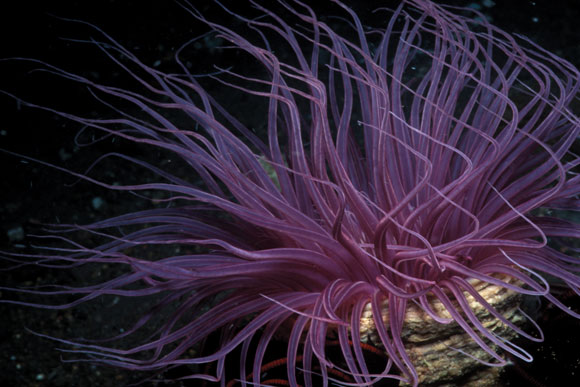by Amanda Bertholf // Fall 2011

There’s a world of unexplored terrain out there. For example, after a decade in the works, an international census of marine life revealed just how much we have to learn about our planet’s oceans. Scientists in more than 80 countries collaborated to study marine biodiversity—from microbes to whales. In addition to discovering and describing more than 1,200 new species, the census documented oceans richer in diversity than previously thought. This got us thinking: Does the final frontier exist? Will humankind ever know everything there is to know? Three experts with ties to UMKC weigh in.
Perspectives: What’s left for us to discover?
Diane Beatty (DB): Technology has continually improved, and we’re able to see various aspects of our own world that we didn’t know existed before. That same technology allows us to look at what’s beyond our world.
John Khuns (JK): We know more about the surface of the moon than we do about the depths of our oceans, and in many ways it’s easier and safer to get to the moon. The ocean census blew me away. One thing that struck me was the discovery of a shrimp that was thought to have gone extinct during the Jurassic Period.
DB: Also in this census, scientists discovered a 20-foot-long squid. How did we miss that before?
JK: There are many things yet to be found in our oceans. There’s the potential to discover cures for what ails humankind. But bringing something up from the depths of the ocean is hard. A fish will explode or decompress. If you’re going to work on a specimen in a lab, you’ve got to be able to keep it alive.
Jeff Rydberg-Cox (JRC): What strikes me is the similarity between what these scientists are facing and what people who conduct literary and historical research are running into. As we digitize things, we’re creating more information in the world than we can possibly digest.
JK: I just read in Science that a Russian team in Antarctica was drilling into a deep lake under the ice. They’ve been drilling for two years. They got within 39 feet of their goal and had to leave because winter was coming. But they’re convinced that there are organisms living there that they’ve never seen before.
DB: There’s a lot of technology that we now look back at and say, “How’d they do that?” How did they build the pyramids? The ancient Egyptians had limited technology, but look at what they did with it. We can learn from our past.
JRC: Ancient technology is amazing. Look at the Colosseum in the center of Rome. It’s basically sitting in a swamp that’s been drained. If we were to build a new stadium, we’d have trucks and heavy machinery hauling out loads of dirt. They had the power of an empire and forced human labor.
“Scientists discovered a 20-foot-long squid. How did we miss that before?”
–Diane Beatty
Perspectives: Are we as creative and inventive as the ancient civilizations were?
DB: You do with what knowledge and resources you have, and if you’re working as a team with that goal, you’ll obtain something productive out of those resources.
JRC: It’s fundamental. Being creative is part of being human. We may be able to do very different things now, but whatever part of our humanity that makes us want to create is similar to and as fundamental as it was thousands of years ago.
JK: I’d hate for us to be in a position that our civilization was devastated to the point of sending us back to the Stone Age because there are many people who don’t know how to survive. If we had to go back and recreate the stuff we needed, we’d be hard-pressed. It’s not just skills, but all the things we need to survive: purifying water, preserving food, creating medicine.
